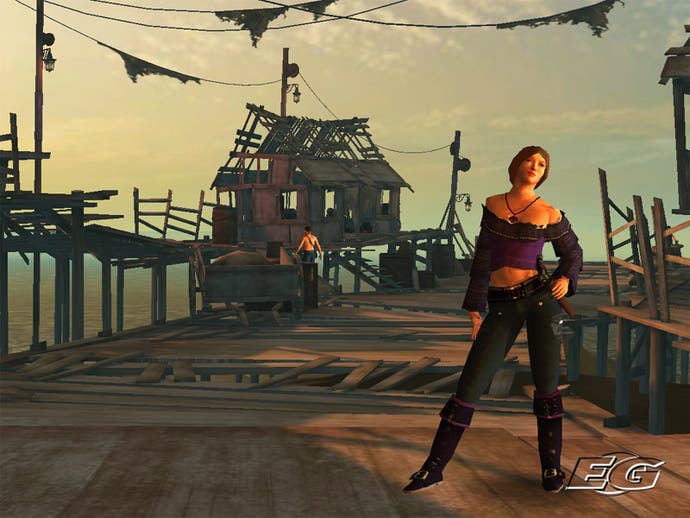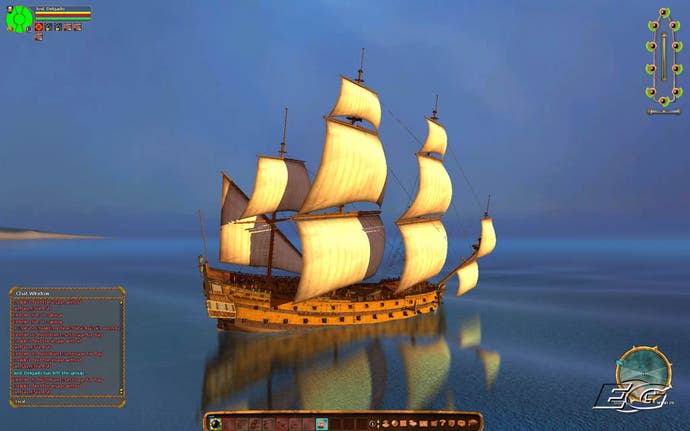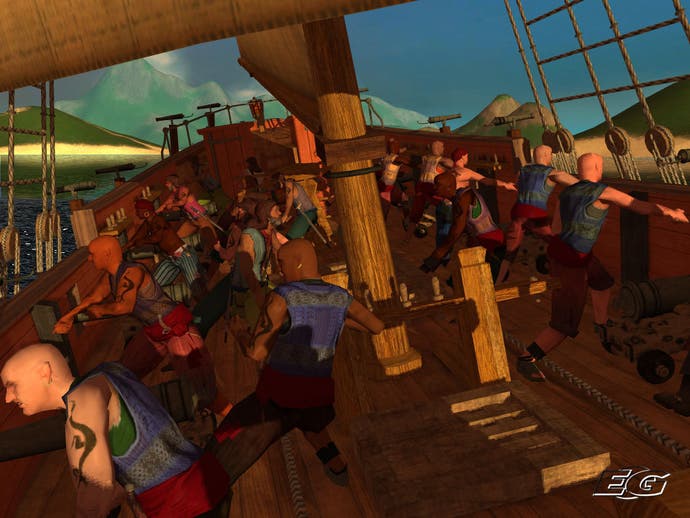Pirates of the Burning Sea
Funding terrorism and organised crime on the high seas.
By comparison, the hand-to-hand combat in the game is extremely weak. It's right back on World of Warcraft territory, with a variety of combat skills that you hammer throughout fights - and although it tries to introduce some new ideas, it's ultimately an unsatisfying experience. We like the idea of a "Balance" bar which you can chip down with special attacks, knocking opponents off their guard, but in practice it feels like a sub-par stats-based combat system, not an exciting round of swashbuckling.
Hopefully, this is something the game will improve upon, because it's a seriously weak link in an otherwise solid chain. Quests which involve hand-to-hand combat are generally very interesting and well-conceived - a far cry from the "collect me twenty Elf testicles" nonsense that populates the rest of this genre - and the developer isn't afraid to create instances especially for quests, staging invasions and battles purely so that you can play through them and advance your storyline. However, it all breaks down a little when you actually have to cross swords with someone, simply because the sword-crossing itself is so tedious.
He's not a Blacksmith - he's a Girl-Faced Fop

Dig a little deeper into the game, and you find yet another system that's unmatched among other MMOGs (not counting the magnificent, if somewhat impenetrable, EVE Online) - the player economy and crafting system. While Pirates of the Burning Sea does have the usual feature where enemies drop loot when defeated - and other loot comes from quest rewards - its economy is a far deeper and broader experience.
From a surprisingly early point in the game, players can set up resource buildings in friendly ports - mines, plantations, logging camps and the like. They can then start manufacturing items to put on the market, or, more importantly, you can build a shipyard and start building your own ships. Again, this happens early on, because it depends on how much gold you've got rather than your level; little of the really good stuff is locked away in higher levels.
As a result, the player economy is thriving, and that's with only a few thousand pre-launch players on the servers. The game is designed heavily around this economy; managing your entrepreneurial efforts is every bit as satisfying as sailing out to capture enemy ships, and we suspect that many players will focus their efforts on this rather than on the combat, making themselves invaluable to their factions in the process.

Ah yes, the factions. There are four factions in the game - the British, the Spanish, the French and the Pirates. Each of the national factions has three classes with slightly different combat abilities, while the Pirates are jack-of-all-trades types with only one class. Each has their home ports, which are safe places for new players to kick off - but the eighty ports which make up the Caribbean in the game are mostly open to conquest, and this will form a huge part of the game.
PvP is used in a wondefully intelligent way in Pirates of the Burning Sea. It's only possible to attack other players (or to be attacked) in clearly marked PvP zones, but these zones are not fixed. Instead, they are centred on ports which are under attack by rival factions, and therefore destabilised, with the level of instability influencing the size of the PvP zone around the port.
It's a great idea, and we're still thinking through some of the consequences. Players may find themselves risking short-cuts through the waters around unstable ports to get to their destinations faster, and nearby ports could also be destabilised if the PvP zone grows large enough. Moreover, the implication from the developers is that ports don't just become destabilised through military attack - it's also possible for players to pull the rug out from under their feet economically, although we're not entirely clear on how that works.
The Sea, The Sea, The Sea is on Fire

We have no illusions about Pirates of the Burning Sea challenging World of Warcraft's throne, but we doubt that its developers are aiming for that lofty goal anyway. The game is too rough and ready for the mass market; its user interface is painful at times, cluttered with meaningless icons right from the outset, and ill-suited to the complexity of some of its underlying systems. However, for a niche audience to whom the idea of a bustling player economy and superbly fluid factional PvP system appeals, the lure of the pirating life will be hard to resist.
This, we sincerely hope, will be an audience big enough to keep the servers ticking over and the game in a healthy financial state. From what we've seen, it certainly deserves it, and it's the kind of game that should attract a loyal cult following. Once it launches, we'll be taking a longer, harder look - and deciding whether or not you should be hoisting your Jolly Roger and setting sail.


